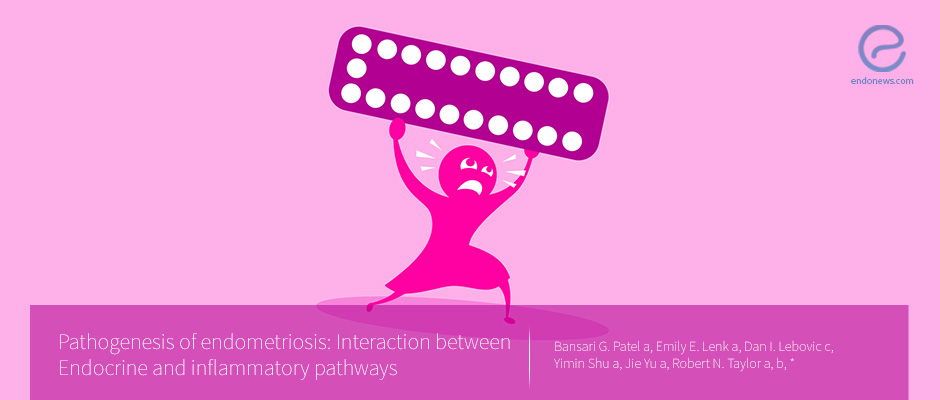Endocrine and inflammatory factors in current understanding of endometriosis
Apr 16, 2018
What causes endometriosis? From classical theories to more recent understanding
Key Points
Highlight:
- This review article discusses not only classical theories that explained the histological origins of endometriosis, but also hormonal and immune factors which represent current knowledge of endometriosis pathogenesis.
Importance:
- Although the historical descriptions of endometriosis dated back to the 17th century, the causes and development are still poorly understood. Endometriosis can present clinically with high variability, signs, and symptoms, which do not correlate with disease extent.
What's done here:
- Discussion of classical theories explaining the histological origins of endometriosis
- Discussion on the growing evidence of the involvement of hormonal and immune factors in mediating persistent endometriosis and the pain/infertility symptoms.
Data:
- Classical theories include 1) retrograde menstruation, 2) coelomic metaplasia, and 3) vascular and lymphatic metastatic spread.
- Endocrine factors include progesterone deficiency or resistance and enhanced sensitivity to estrogen action.
- Inflammatory factors include immune dysregulation in patients with moderate to severe endometriosis. These are reduced T-lymphocyte-mediated cytotoxicity, defective NK-cell activity, and immune tolerance break down.
- Drugs which simultaneously modify the endocrine and immune system may prove to be more useful.
Lay Summary
There are three forms of endometriosis: peritoneal, ovarian, and deep infiltrating. All three forms consist of endometriotic lesions containing endometrial glands, stroma, nerves, blood vessels, and inflammatory cells. Endometriosis symptoms can be accounted by these elements and the involving organs. However, the exact factors contributing to endometriosis-associated pain or infertility are not clearly understood.
This review article published in Best Pract Res Clin Obstet Gynaecol journal by Patel et al. from Department of Obstetrics and Gynecology at Wake Forest School of Medicine in Winston-Salem, NC, USA discusses classical theories of the histological origins of endometriosis. In addition, the authors described increasing growing evidence to support hormonal and immune factors which cause persistence endometriosis by activating local inflammatory microenvironment and leading to symptoms like pain and infertility.
Three popular classical theories of endometriosis include 1) retrograde menstruation, 2) coelomic metaplasia, and 3) vascular and lymphatic metastatic spread. Retrograde menstruation describes that endometriosis results from the free flow of blood and shed endometrial tissue from the fallopian tubes into the peritoneal cavity. These endometrial cells then adhered to and invade serosal and peritoneal mesothelial. The metaplasia theory, on the other hand, suggests that endometriotic lesion arises from differentiation of another cell type (e.g., mesothelium) into the endometrial epithelium. Lastly, the vascular and lymphatic metastatic theory suggests that menstrual tissue travels from the endometrial cavity and spread to other distant sites through the sentinel lymph nodes/lymphatic channels/veins.
More updated theories regarding endocrine factors in endometriosis include (i) progesterone deficiency or resistance where progesterone action on the uterine is abnormal, thus causing endometriosis, and (ii) enhanced sensitivity to estrogen, suggesting excessive estrogen signaling in endometriosis. Clinically, some examples of hormone effects in endometriosis risks may include nulliparity and never-users of oral contraceptives.
On top of endocrine factors, numerous recent research has suggested the importance of inflammatory factors in endometriosis. Subtle immune dysregulation is associated with patients having moderate to severe endometriosis. Alteration in immune parameters such as reduced T-lymphocyte-mediated cytotoxicity decreased immunosurveillance and defective natural killer cells activity have been found in endometriosis. Endometriosis may also associate with immune tolerance break down which causes the chronic inflammatory response.
In summary, the exact etiology of endometriosis is complex. Advances in cell biological, transcriptomic, and proteomic technologies have provided substantial evidence that endocrine responsiveness and inflammatory activation are important factors in endometriosis. Hence, new drug development, e.g., gonadotropin-releasing hormone antagonist and selective estrogen receptor modulator that can exert antiestrogenic and immunosuppressive activities may be particularly useful.
Research Source: https://www.ncbi.nlm.nih.gov/pubmed/29576469
endometriosis etiology hormone inflammation immune system etiopathogenesis infertility

